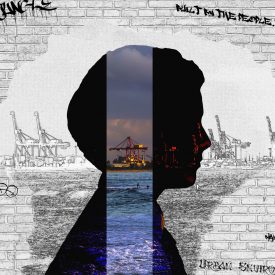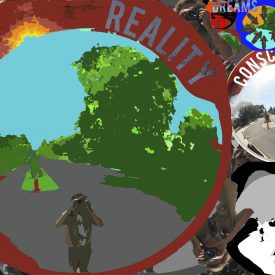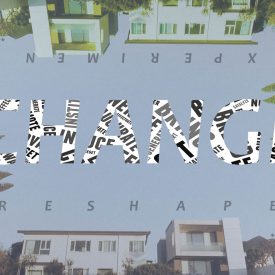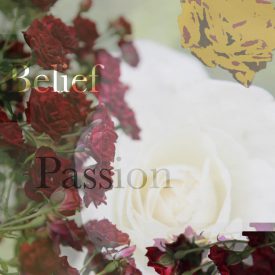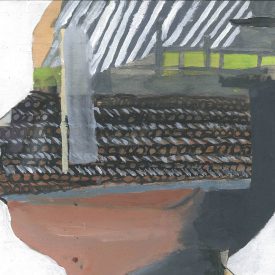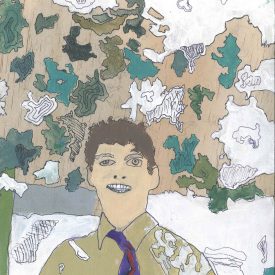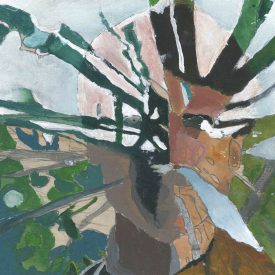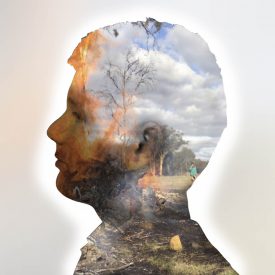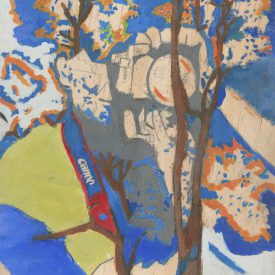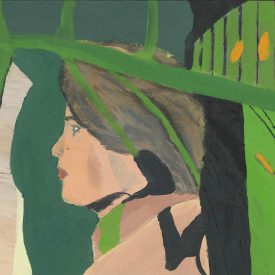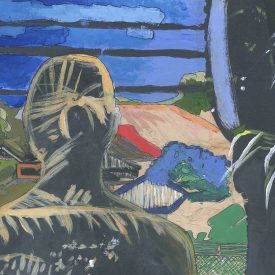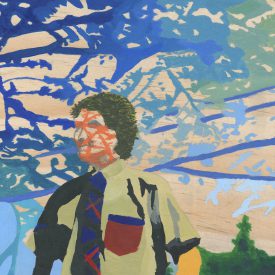Changing Tide
Campbell Williamson, Year 12
Slap. I wipe the bloody remains down my leg and turn to grab the Aerogard, suddenly caught in the glow of the afternoon sun dressing the foreshore in a cloak of gold. Bewitching shafts of light stream down through the overhanging gum trees, dancing on my watch face before rushing into my eyes. Against this dressage of beauty, out there, deep within the river, I notice a shimmering figure working against the current. It removes plastic bags, seizes loose cans and gallantly struggles on. Alone. No one seems to care.
I resurface in the present, acknowledging the loud buzz of the picnicking families surrounding our area. These people are focusing on the important things in life, Sunday papers and the rising scent of their sizzling sausages on their Kleenheat barbies. They too enjoy the water as it hides in plain sight; force-fed cocktails of human waste, under a thin veneer of golden sun each day.
Sprawled around me in an arc are salads, sandwiches, pies and pasties and a basket of oranges. Red cherries burst from their plastic coffins and juice from an enormous watermelon begins to trickle from an upturned container. It runs down and wets my bum. Metres away, the river feasts on the very chemicals that swelled these fruits to their tasty and exquisite best – yum!
On my right, David, my older brother frowns at his phone as he tends to his raging social life. He is short and thin in all places except his belly, which protrudes slightly underneath his shirt. When standing, his arms seem to sag past his knees and I think it makes him look like a Sumatran Orangutan. I notice him grope for a luscious, ripe, red cherry as he fills the area with his heavy breathing.
I sit up. “Now?”
Mum’s ensconced in her Women’s Weekly and doesn’t even bother to look up. I can only see the top of her comically oversized rose glasses and her faded, straw, broad-brimmed hat as she adjusts it further down her face.
“Thirty minutes, love. No Swimming,” she says as she sucks something from between her teeth, returning to the important things in life.
I nick a final sausage roll and brush the camped pastry off my shirt. “Please? I won’t go swimming, just wading.”
The only response is David’s heavy breathing.
I unload my questions of interrogation – Why? Why not? How long? When till? She slowly lowers the magazine mask and gives me a stare that knocks the heat out of the sun.
“What if I go with David?” I sigh.
For the first time in recent memory David’s face leaves his phone screen and molds into a look of puzzled betrayal. Amongst the gulp of the river, I hear my mum exhale a solitary “Yes”.
I’m already gone, sprinting along the perfidious embankment being sure to avoid the countless cracked bottles and double-gees. A sort of thirty-metre sprint completed on alternating legs. Promptly, I realize I’ve forgotten David and rush back, pulling him away mid argument with mum. My bare feet turn green and the smell of grass permeates the surrounding air as David is dragged along by his arms, dragged away from that picnic blanket that sits on the grass by the foreshore.
We weave between barbecues and dogs and cricket matches and, ultimately, stumble straight through a hide-and-seek game, coming out the other end onto the sand.
The sun is beginning to fall in the sky and I notice a shadow, which sits on the water like sunscreen atop a pool. A cold gust of wind pushes against me and I look ahead to the city, the old brewery, the cars and the boats. The lone swimmer is just a speck now, still struggling valiantly against the pull of the water.
“Are we at the river or the ocean?” I ask.
“Do you listen to yourself when you talk, Dingus?” replies David, phone light reflecting onto his face.
“Yeah well, I guess it’s the river but what difference does it make anyway, it’s all related, it’s all… hey look jellyfish! In the water!” I yell as I kick up sand in joy.
David is so thrilled he doesn’t even budge his gaze.
Excitedly and without thinking I begin to wade out. Past where the tiny waves break, looking for that globular creature. Water grasps at my knees and I roll up my shorts as I start getting deeper and deeper. The river roars in my ears.
Reaching down toward the darkness, the tide spits a jellyfish into my path. I smile excitedly as it slaps into my grasp. It’s cold and slimy and foreign.
I turn around and call for David but he’s out of sight. Even the swimmer is gone. I look down and focus on the thing that now occupies my hand, still cold and still slimy. I see its unnatural red colour; I notice its sagging tentacles blotched with boils and how slender the entire thing is. Disgusted, it falls ungraciously in a heap back under water leaving nothing behind but that slimy sensation.
I scrub my hands in the water but they won’t come clean. Unsure, I just stand there awkwardly in the tide.
Slowly, I begin to clamber back ashore, trying to shut out the putrid smell of decay that shadows me. Backing away from the river, I run. Back, through the hide-and-seek circle, across the cricket match, past the dogs, between barbecues and through crowds. Returning, I sit down next to Mum and hide my face behind a magazine, trying to focus only on the smell of sausages.

